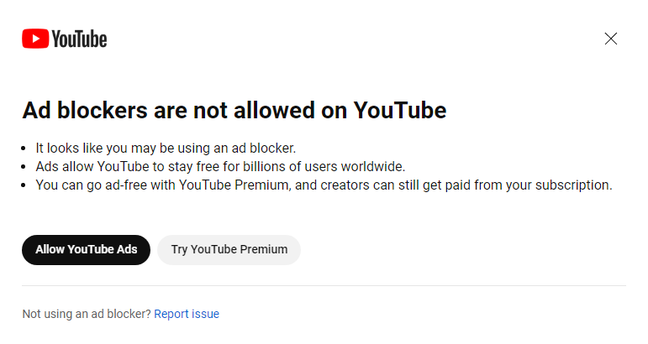YouTube's 'Ad blockers not allowed' pop-up scares the bejesus out of netizens
Just a small experiment – for now?
YouTube has begun showing a pop-up to some viewers warning them that "ad blockers are not allowed" on the video-sharing site.
The banner, which you can see below, appears if the Google subsidiary reckons you're using some kind of content blocker that prevents videos from being interrupted by or book-ended with adverts.
According to YouTube, this is an experiment and only a small number of watchers will see the pop-up when browsing YouTube.com. The box tells users, "it looks like you may be using an ad blocker," and reminds them that "ads allow YouTube to stay free for billions of users worldwide."
It also urges you to "go ad-free with YouTube Premium, and creators can still get paid from your subscription."
There are two options presented: a button to "allow YouTube ads," and a button to sign up for YouTube Premium, an ad-free subscription that costs $11.99 a month at least here in the United States.
Those who have seen the pop-up say they can ignore those options, and close the pop-up and continue blocking ads as usual – though for how long, who's to say? There is a link to click if you're not using an blocker and want to report a false detection.

What the YouTube ad block warning looks like ... Hat tip: Reddit
"One ad before each video was fine, but they got greedy and started playing multiple unskippable 30-second ads, that's when I went for ad block," as one viewer put it. "There is zero chance I am ever deactivating it or paying for Premium now, that ship has sailed."
Another was more blunt: "They must be out of their minds if they think this'll get less people to not use ad blockers."
YouTube's terms of service, last updated in January 2022, do not explicitly ban or even mention ad blockers, though there are broad statements in there forbidding, say, the modification of video content and the circumventing of parts of the service, which we suppose might cover browser extensions and other tools that strip out ads from pages.
We're kinda surprised it's taken YouTube this long to tackle online advert refuseniks head on. It feels as though the video giant has been stepping up its advertising, pushing more and more unskippable promos to viewers. YouTube's ad revenue stood at $29.2 billion in 2022, just up from $28.8 billion in the year before, making up just over 11 percent of Google's total annual revenue.
Crucially, though, YouTube banked $7.96 billion from ads in the final quarter of 2022, down nearly eight percent from a year-ago's $8.63 billion.
- Google Cloud makes its first profit, 15 years after launching
- Miffed Googlers meme on CEO's $226M pay award amid cost-cutting campaign
- Singapore tells its people: Go forth and block those ads
Late last year, YouTube said it had reached 80 million Premium subscribers, up 30 million from 2021. If you take that 80 million and multiply it by 12 bucks a month, that's $11.5 billion a year. Parent org Alphabet said [PDF] in February there was "great momentum" in YouTube subscriptions.
While video creators ought to get paid for making decent videos, and the infrastructure powering YouTube is ludicrous in its size, cost, and complexity, it's not like the 'Tube is hurting for subscriptions. Maybe with more and more people willing to pay for the service, the biz feels now's the time to turn the screws on holdouts refusing to even view ads.
Online advertising is in a bit of a slump, with Google’s advertising revenue dipping 3.6 percent to $59 billion in Q4 2022, so that's probably weighing on the web giant's mind.
In defence of online ads: The 'net ain't free and you ain't paying
COMMENTAnd it all comes as Google wrestles with the handling of ad and content blockers in Chrome; the web giant is trying to move the browser extensions to a new API, dubbed Manifest v3, that protects users from malicious add-ons but may limit the effectiveness of blockers.
A spokesperson for YouTube told The Register on Wednesday: "We’re running a small experiment globally that urges viewers with ad blockers enabled to allow ads on YouTube or try YouTube Premium. Ad blocker detection is not new, and other publishers regularly ask viewers to disable ad blockers."
The rep declined to confirm for us how long the experiment will run, and whether signing up for Premium or allowing ads is or will at some point become mandatory. ®
